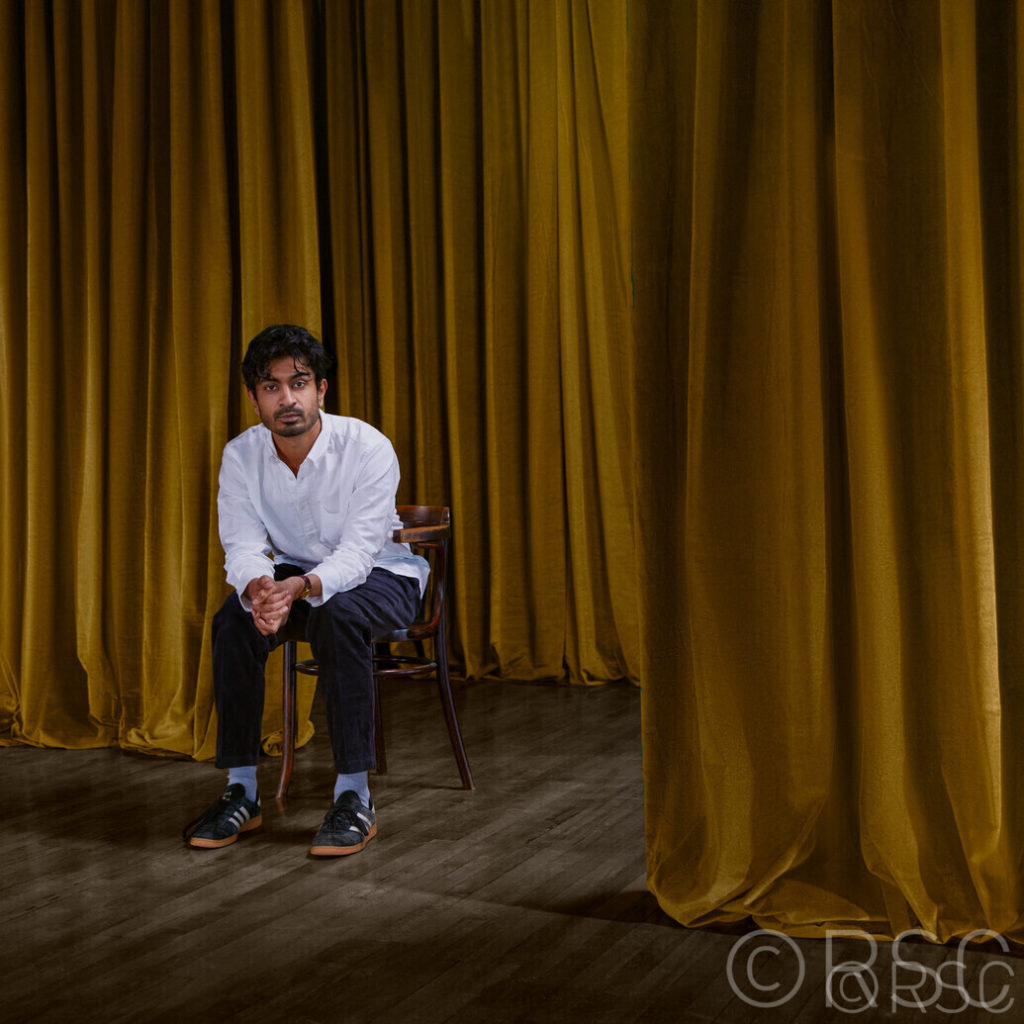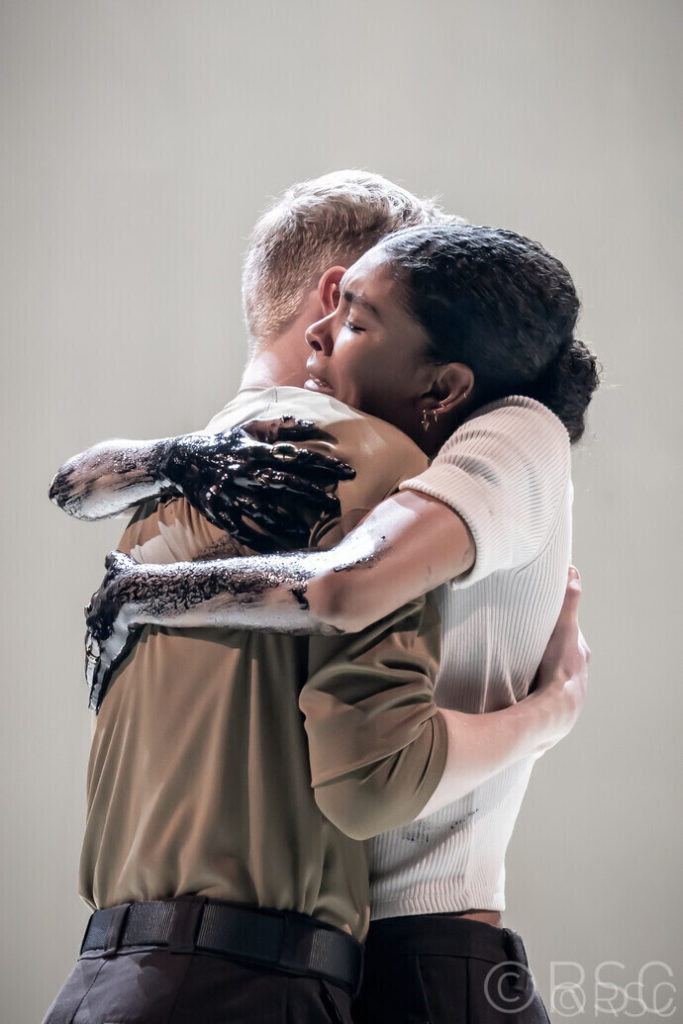
ATRI Banerjee directs Shakespeare’s fast-paced political thriller Julius Caesar on the Royal Shakespeare Company’s return to York Theatre Royal from tonight (13/6/2023) to Saturday.
Concerned that divisive leader Julius Caesar (Nigel Barrett) poses a threat to democracy, revolutionaries take the violent decision to murder him but without a plan for what happens next. As the world spins out of control, chaos, horror and superstition rush in to fill the void. Civil war erupts and a new leader must rise, but at what cost?
This production asks: how far would we go for our principles? “We know it’s a political play, a play that speaks to our politics, speaks to who gets to be a leader, and asks us to think about what you do when you don’t agree with the people in power,” says Atri, who is directing his first Shakespeare production for the RSC through the Open Hire scheme, set up Josh Roche and Derek Bond to encourage a more transparent application process within the theatre industry to stop it feeling like a closed shop.
Atri had first studied Julius Caesar at university. “I really felt, when coming to the play this time last year when I got this job, that this was a play that speaks about power, who holds it, who challenges it, and the gulf between politicians and the people they are meant to be leading.
“It speaks not only to the Ukraine situation but to the idea of governance in this age of Covid and Partygate. What I find interesting is that Shakespeare does not make either the leader or the conspirators the hero.”
Atri reflects on the prevailing political environment wherein Shakespeare penned Julius Caesar. “He was writing the play at a time when Elizabeth I was coming to the end of her reign. There had been plots against her, and there was a question of who would succeed her,” he says. “So even in Shakespeare’s day he was using this Roman story to talk about Elizabethan England and what happens when there is a possible power vacuum.”
Atri wanted to make a production that “felt like it could speak about today”. “I think we live in a world where a series of crises have happened, particularly over the last seven years, from Brexit, to Trump, the war in Ukraine, the pandemic, events that have revealed the massive rifts we have in our society between class, gender, race, disability, across every intersection of power,” he says.
“The questions I was asking myself were, ‘when you feel like the world is in a bad place, what steps do you actually take to make the world a better place? What are the limits of peaceful activism? How do we react, for example, to the likes of Extinction Rebellion, or the two young women who threw tomato soup at the Van Gogh painting?’.
“I’m also very aware that it’s easy to put Julius Caesar in a Donald Trump wig and cast him as the baddie in a way that’s quite black and white. But I’m more interested in creating a production that makes an audience feel the conspirators were both totally right to kill Julius Caesar, and totally wrong to kill Julius Caesar at the same time.
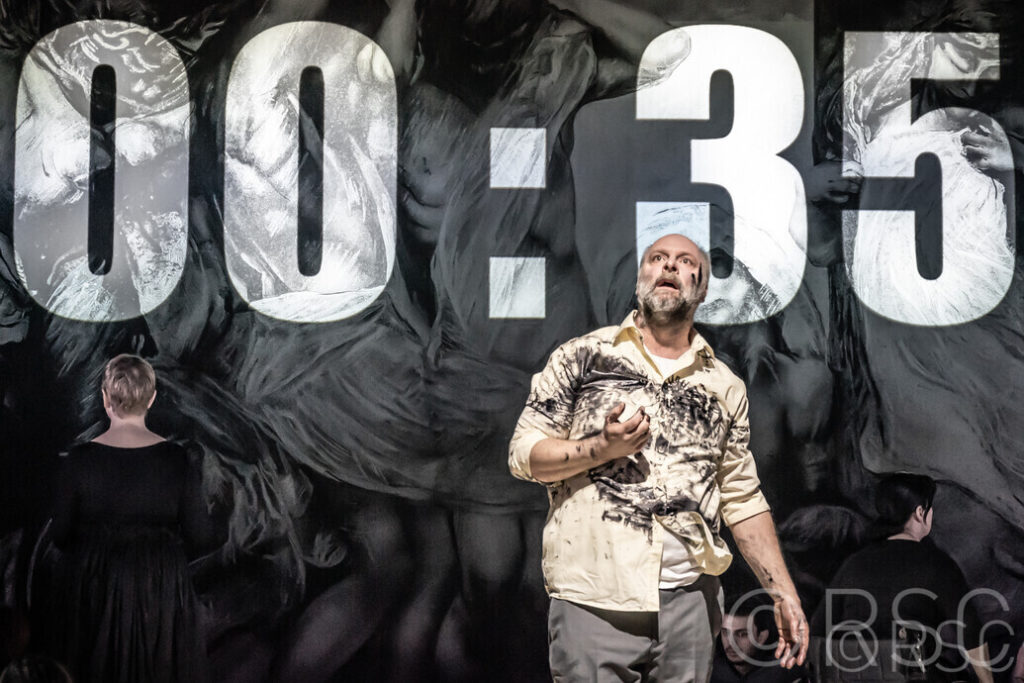
“I wanted to capture that ambivalence that’s central to what Shakespeare has written. Shakespeare isn’t offering any solutions. I don’t think he is saying one way is good and one way is wrong. Because the actions the conspirators take to assassinate Julius Caesar plunges Rome and the world into even more chaos.
“So, what appealed to me about directing Julius Caesar is that it felt like a play that could think about these huge moral grey areas that we exist in without trying to draw any easy conclusions.”
Consequently, we can always ask questions of our own society. “Cassius and Brutus were called liberators and saw themselves as trying to enact political change, seeing what might be possible through an act of radical violence,” says Atri.
“It’s about people just putting one foot in front of the other, rather than thinking about the devastating consequence for the nation, plunging people into a civil war, even though Brutus and Cassius came from a position of wanting to do the right thing, stopping autocracy by dramatic action.”
Atri continues: “I think theatre is the space for nuance; theatre can be a place for political change; not the play itself, so much as people in the audience contemplating the play afterwards, having conversations in the bar or on the way home.
“Whether it’s Novak Djokovic speaking about the Serbia-Kosovo conflict; Israel and Palestine; Stop The Boats, there is nuance in every case, and we should try to be alive to as many nuances as possible in any theatre production we do.
“The reason we keep coming back to these classics is we know Julius Caesar will be assassinated but Shakespeare’s play gives you a vessel within which you can think about things in a safe environment and look at them in a new way.”
Atri hopes audiences will come away from his production asking the questions, “What would I do? Would I go as far as to kill someone who is my best friend if I really thought that was going to make the world a better place?”
“The answer is probably no to murder(!), that’s the extremist version of it. But at what point do you glue yourself to Downing Street; at what point do you put yourself in front of a horse like the suffragettes did?” he ponders.
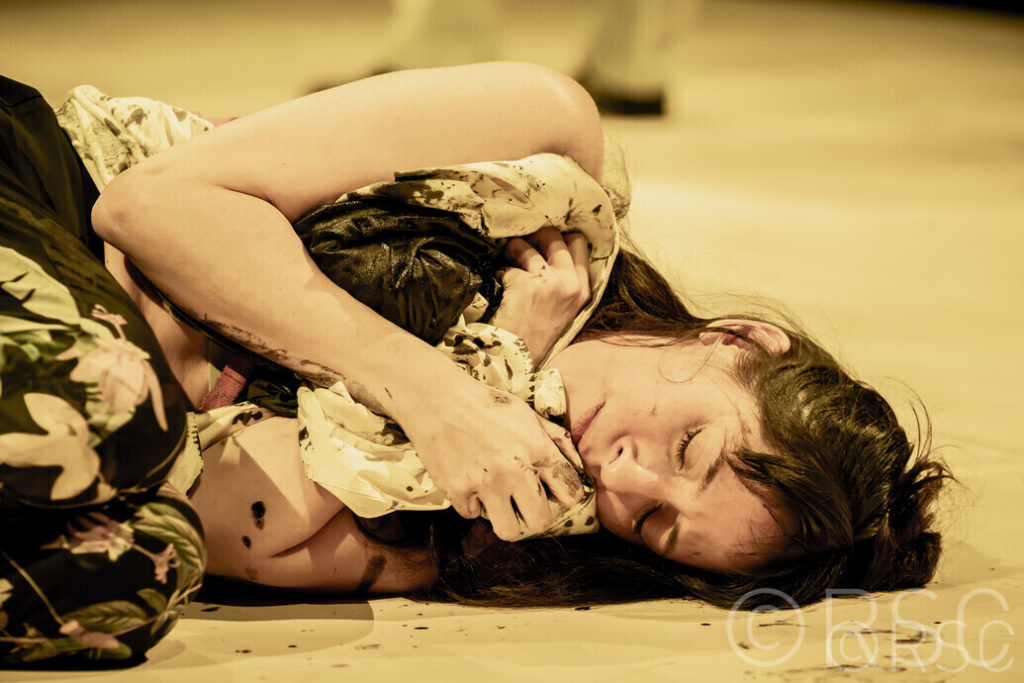
“We live through waves of political crisis, and activism tries to combat the crisis, but at what point do we resort to violence?”
As for the setting of his Julius Caesar, “it’s not in Westminster, but neither is it in ancient Rome,” Atri says. “It draws on elements of the modern and the ancient world to create our own world really.
“Taking influences from impressionist theatre, from choreographers like Pina Bausch, and from German theatre to make a world that feels quite stylised and heightened.
“I’m also very keen to convey a sense of the supernatural and time running out. The play has ghosts, omens and prophecies. The Soothsayer famously tells Caesar to beware the Ides of March. Characters are always worried about the time, and time running out.
“That relates to the climate crisis we face: if we don’t act now, we will reach the unmanageable temperature for living. It feels to me that Julius Caesar, like the world we live in today, is a play that’s set in a place of emergency. The threat of apocalypse feels very close.”
Atri’s fresh interpretation casts a female Brutus (Thalissa Teixeira) and non-binary Cassius (Annabel Baldwin). “Along with several other parts across the company, we’ve re-imagined the roles of Brutus and Cassius to tell a story about power today: who holds it, who wields it, and who gets to challenge it,” he says.
“Julius Caesar is the perfect play for our age of emergency, asking uncomfortable questions about today. When asked to imagine a better future for us all, what resources do we have left? What are the limits of peaceful activism? How far would you, personally, go to make the world a better place?
“By thinking of the roles in this play across intersectional lines – gender, race, class, disability, among others – we’re inviting audience members to think of their own place within the status quo and what might be at stake for each of us within it.”
Atri adds: “With the way we have cast it, we’ve not pitched the struggle between Caesar and Brutus and Cassius entirely on gender, but it brings different associations to that dynamic and asks us to look at the changing dynamics of power now.
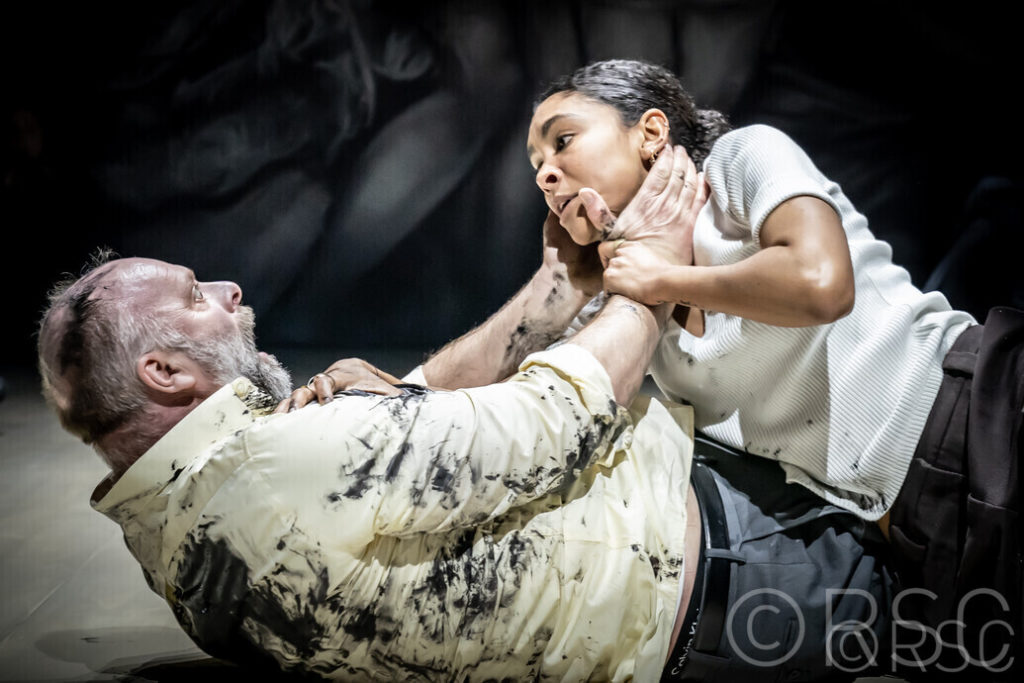
“Both Thalissa and Annabel are young actors, and that means that young audiences, though not only young audiences, can identify with these characters, whereas men in togas might have felt more foreign. If people see people that look like themselves on stage, which is a question of representation, then they can identify with their situation and the question of: ‘if you were in this situation, what would you do?’.
“We have undergone seismic changes, from the Brexit vote, the election of Trump as president, Covid, Black Lives Matter, the legacy of slavery and the British Empire, all sorts of historical pressures, and that means that within the space of the arts and culture, there is such an increased awareness of gender identity and the so-called culture wars that prevail now.
“I would encourage anyone who is making the judgement, ‘oh, they are casting Brutus as a black woman’, to slow down and reflect, and I speak as someone of South Asian origin taking on directing this play.”
History repeats itself down the years. “There will always be dictators, always be politicians, tyrants and non-tyrants,” says Atri. “The idea of democracy will rise and fall, rise and fall, with the passing of time, and Shakespeare was very aware of that. Shakespeare has that meta-reality that this play will resonate through time, through the ages, and will speak to different generations.”
Was working for the RSC always on Atri’s radar? “I come from Oxford, so the RSC was somewhere I used to visit as a teenager as it’s only an hour away [in Stratford-upon-Avon],” he says. “I saw productions like Rupert Goold’s The Merchant Of Venice and Maria Aberg’s As You Like It.
“I directed a community production for the RSC at the Marlowe Theatre in Canterbury in Autumn 2021 called Error, Error, Error. Over half the company was made up of people affiliated with Canterbury Umbrella; adults with mental health or learning disabilities and those who are isolated in the community.
“It was an extraordinary experience to work on a show that gave this group of people the opportunity to experience what theatre making is.”
Now he is directing his first professional Shakespeare production.“It feels like a homecoming,” he says.
“It’ll be my first show to play York too. The Theatre Royal is a very beautiful space.”
Royal Shakespeare Company in Julius Caesar, York Theatre Royal, June 13 to 17, 7.30pm plus 2pm Thursday and Saturday matinees. Box office: 01904 623568 or yorktheatreroyal.co.uk.
Atri Banerjee: back story
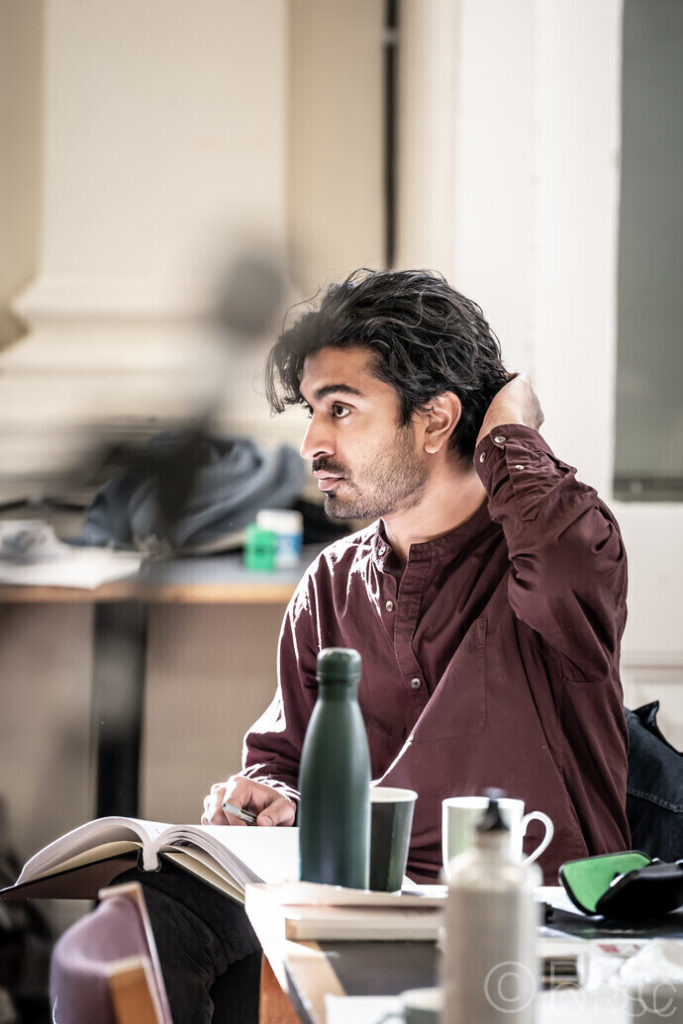
WON The Stage Debut Award for Best Director and a UK Theatre Award nomination for his production of Hobson’s Choice at Royal Exchange Theatre, Manchester.
Other credits include: The Glass Menagerie (Royal Exchange, Manchester); Britannicus (Lyric Hammersmith); Kes (Octagon Theatre,Bolton/Theatre By The Lake, Keswick); Harm (Bush Theatre, London, also broadcast on BBC Four) and Utopia (Royal Exchange Theatre).
Named in The Stage 25 list of theatre-makers to look out for in 2022 and beyond.
In November 2022, along with Rachel Bagshaw, he was awarded a Peter Hall bursary by the National Theatre to support him in developing work for the NT’s stages.
Recruited for role as director of Royal Shakespeare Company’s Julius Caesar through Open Hire, a new initiative to improve transparency and access to freelance creative jobs in theatre.
“I got into directing when I was still at school,” says Atri. “I wrote a version of Macbeth with two of my friends, set in 1950s’ Hollywood and called Big Mac. I didn’t really know I wanted to be a director as a teenager, but I saw lots of shows – at places like the Oxford Playhouse, where I grew up – so regional theatre and touring theatre are really important to me.
“I went to university to study English and then did a Masters in Medieval and Renaissance Literature, and throughout that time I did a lot of shows with my student drama society, including quite a bit of Shakespeare.
“When I left university, I still didn’t know if I wanted to be a director, partly because of the freelance struggle of it all, so I got a job as the press assistant at the National Theatre, where I met lots of amazing creatives and artists, and I decided that directing was the thing I wanted to do.
“I did a Masters in directing at Birkbeck [University of London], where the first year is training and the second year is a placement. I was at the Royal Exchange Theatre in Manchester, where I stayed for a couple more years.
“Some of my career highlights to date include Hobson’s Choice, my first big show at the Royal Exchange, which was a South Asian version of [Harold] Brighouse’s play; Harm at the Bush Theatre, and more recently, Kes at the Bolton Octagon; Britannicus at the Lyric Hammersmith; and The Glass Menagerie, again at the Royal Exchange. The Glass Menagerie had been cancelled by the pandemic, so it was amazing to finally bring it to the stage.”
